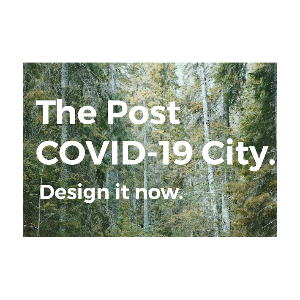
THE POST COVID19 CITY 2021
Cities are the fastest growing human settlements on the planet. Cities occupy only 1% of the earth’s land mass, but by 2050 will host more than 68% of the world’s population. Cities are growing upwards and outwards to accommodate this rapid urbanization. Due to this expansion, cities will continue to encroach on many of the earth’s most important natural resources such as rich biodiverse areas and land critical for agricultural use (Nature in the Urban Century). This expansion will have profound impacts on global ecosystems. In 2020, we all witnessed the natural world collide with human life with the spread of the COVID-19 virus that upended life as we knew it. Right now, cities are the site where efforts to curb the spread of the virus are the most critical.
What will our cities look like Post-COVID-19? The answer is, they’ll be exactly as we design them. Now is the time to start thinking about that design.
THE POST-COVID-19 CITY colab is a multidisciplinary call to action that challenges urbanists, innovators, entrepreneurs, artists, researchers, scientists, and various other types of urban practitioners and planners from around the world to reset our thinking on how sustainable, resilient, liveable and just cities can be built for urban futures that nurture human-nature relationships. Envisioned submissions are encouraged from diverse transdisciplinary perspectives, including but not limited to: natural sciences, technology and engineering, social sciences, communications and media, fine arts and film, urban planning and design, urban practitioners, and other sectors. Submission ideas and suggestions may include but are not limited to: nature-based solutions, biotechnology, biomimicry, collaboration and planning process innovations, methodologies, models, software and mobile application solutions, data collection and knowledge gathering innovations, illustrative art and design works, architectural ideas and modelling, mapping and GIS solutions, community and urban citizen engagement ideas for participation, etc. that can help us nurture our relationship with cities in nature.
Pitch an innovation at any scale that improves people-nature connections in cities, specifically with nature, biodiversity, and ecosystem services, such as, food, water, and energy.
Your pitch should answer the following questions in the section "Description":
Where is the location ? (city, country)
Why is your proposal important?
Explain how the innovation would work?
What would be the impact?